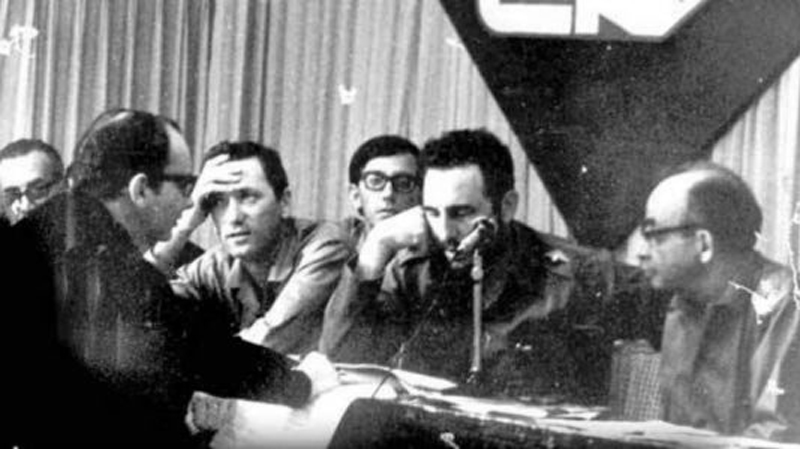
Sixty years have passed since that historic exchange between Fidel and a group of intellectuals (June 16, 23 and 30, 1961), in an environment that Nicolás Guillén, Alejo Carpentier, Alfredo Guevara, Miguel Barnet and other personalities would remember for posterity as of total transparency.
The analysis made by the maximum leader of the Cuban Revolution has become a guideline not only for those who make literature, but also for those of us who carry out the irreplaceable task of informing.
Thus, these lines evoke edges of that final speech that has gone down in history as Words to Intellectuals. If Fidel did not do it with his proverbial transparency, surely they would do but in a cloudy, poisonous and underhanded way, the supporters of disunity, those who really do not seem to have been born for the truths ...
The Commander in Chief knew well that a part of the intelligentsia was concerned with freedom for artistic creation. Inside and outside the auditorium, there were those who feared that the Revolution could stifle the creative spirit of writers and artists, stifle that freedom, particularly that of content in the expression of art.
I do not know if some would still ignore the vision of our top leader. I only know that, after qualifying the discussion as instructive, entertaining and more apt to learn than to teach, he was crystal clear in expressing:
"Let me tell you in the first place that the Revolution defends freedom, that the Revolution has brought to the country a very large sum of freedoms, that the Revolution cannot be essentially the enemy of freedom ..."
For this reason, he considered unnecessary and without reason to be the concern that the revolutionary process would suffocate the creative spirit.
"... The field of doubt," he said, "no longer exists for truly revolutionary writers and artists ... it remains for writers and artists who, without being counterrevolutionaries, do not feel revolutionary either."
The Revolution cannot pretend to suffocate art or culture, when one of the goals and one of the fundamental purposes is to develop them, so that they precisely become the true heritage of the people, he emphasized.
Six decades from that moment, I can imagine the silence in the National Library room, pens and pencils trying to take hurried notes, heads nodding without noticing themselves in that understanding movement.
Fidel added, little by little, only with the truth, only with the word, only with the arguments, even those who perhaps had arrived there more bitten by the tendency to subtract or divide than multiply.
His speech was a blow against discouragement, against doubt, against pessimism.
“I believe that without being optimistic you cannot be a revolutionary - he reiterated - because the difficulties that a Revolution has to overcome are very serious. Moreover, you have to be optimistic! A pessimist person could never be a revolutionary”.
In the same way, without an bit of condemnation, he lamented the opportunity lost by those who, being able to be the protagonists of the revolutionary changes here, preferred to "immerse themselves in the entrails of the imperialist monster", turned into "fugitives and deserters from their homeland."
"On the other hand," he stressed, "you have the possibility of being more than spectators: of being actors in that revolution, of writing about it, of expressing yourself about it."
Sixty June have turned around Cuba since that dialogue in which, as Fidel also observed, there was plenty of space to express and defend divergent points of view with complete freedom. For generations, a phrase has remained: Within the Revolution, everything ; against the Revolution, nothing.
It was not so synthetic. In the speech, he continues like this:
“Nothing against the Revolution, because the Revolution also has its rights; and the first right of the Revolution is the right to exist. In addition, in the face of the right of the Revolution to be and to exist, no one - because the Revolution understands the interests of the people, because the Revolution means the interests of the entire nation - no one can rightly claim a right against it. I think this is very clear”.
June, 2021. Who says Fidel is gone?
Creators, artists, journalists, and other intellectuals carry, without taking an internal inventory day by day, the essence of those words.
That there have been and will be deserters, who doubts it? That there have been and will be wars with recruits who exchange dignity for money, who can doubt it? That masters have emerged in the art of writing with such an amphibological and "modernist" technique that their turn could be the same for the left as for the right: no one doubts it.
However, they are the least and they do not make up summer. This is not journalism, literature, art, or culture that sustains us as a nation. Even so, a lot of smell, eardrum, touch and vision. Although the years, the decades, the centuries pass that great truth told by Che ("to the enemy, not even a little bit like this ") is a twin expression of what Fidel told us, also to all of us ... for that first, simple and extraordinary, right of the Revolution to exist.




